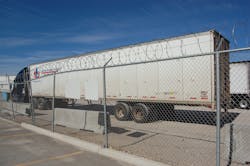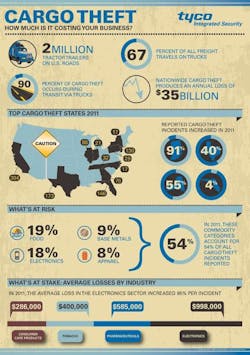The upcoming July 4th holiday celebrating U.S. independence is one of several holiday weekends cited as being “notorious” for higher-than-normal risk for cargo theft for motor carriers, logistics providers, and shippers alike.
Security firm FreightWatch International noted in a recent update that organized theft rings understand holiday weekends cause shipments to be unattended for extended periods of time and thus mobilize to take advantage of that situation.According to FreightWatch’s data, cargo thefts occurring over Independence Day weekends between 2010 and 2014 had an average value of $145,267, including eight separate incidents with a declared value of over $250,000.
Michael Nischan, VP of transportation and logistics risk control for EPIC Insurance Brokers & Consultants, told Fleet Owner that holiday weekends like July 4th are when cargo thieves “really go to work” because cargo can sit exposed for longer-than-normal stretches as FreightWatch noted above.
“Improving cargo security is really all about taking a layered approach; there is no one silver bullet to this problem,” he explained. “It’s not about adding locks to trailer doors, establishing securement protocols for drivers and dock workers to follow, or adding GPS tracking to all shipments. It’s about doing all of those things and more together within a comprehensive program.”
Nischan believes deterring cargo thieves boils down to three critical elements: securing trucks, trailers and the cargo within them; securing cargo facilities; and making sure that the less who know about a shipment and its destination, the better.
“Cargo thieves are very smart; more are organized criminals that conduct surveillance and even go so far as to plant one of their members within a carrier’s or shipper’s workforce to gain an understanding of dock layouts and other details,” he said.
The ongoing challenge, however, is that many cargo theft groups are “quite bold” so that even rigorous security measures such as surveillance cameras and driver thumbprint requirements may not be enough to deter them, Nischan noted.
“The key is to be deliberate and to be aware of the latest developments,” he emphasized. “For example, there are eight cargo security councils across the country that work together with industry and with law enforcement to keep everyone as up to date on cargo theft activity and trends as possible. Staying informed is that first critical step.”
About the Author
Sean Kilcarr
Editor in Chief
Sean Kilcarr is a former longtime FleetOwner senior editor who wrote for the publication from 2000 to 2018. He served as editor-in-chief from 2017 to 2018.

